XFX’s Radeon HD 7970 Black Edition Double Dissipation: The First Semi-Custom 7970
by Ryan Smith on January 9, 2012 6:00 AM ESTOverclocking
Though XFX does not provide any overclocking tools for the BEDD, the card itself is advertised as an overclocking card to an extent. The use of the AMD PCB and a similarly high performing cooler means that overclocking results shouldn’t be much better or much worse than reference cards, but given how much potential we’re seeing out of the 7970 this is not a bad thing.
Even with XFX’s factory overclock the BEDD features the same 1125MHz overdrive limit as all current 7970 cards, so you have 125MHz (~11%) to play with within Overdrive. Based on our experience this is right at the edge of what’s this card is capable of – after pushing the card to 1150MHz through MSI’s Afterburner software we found that our sample peaked at 1125MHz anyhow, as anything beyond that impacted stability and caused artifacts. Meanwhile we were able to push our memory to 6.3GHz, as beyond that point performance plateaued as the need for error correction nullified our gains.
Our final clocks were 1125MHz core and 6.3GHz memory, representing a 21% core and 14% memory overclock over the reference 7970, or an 11% core and 11% memory overclock over XFX’s factory overclock. As the BEDD uses an AMD PCB it should be possible to use compatible voltage tweaking software to push it further, but for the time being we’re limiting ourselves to what the 7970 can do on stock voltage as the AMD PCB isn’t particularly overbuilt for overvolting. On that note we did increase our PowerTune limit to +20% (300W) in order to ensure PowerTune didn’t throttle our overclocked BEDD, though there appears to be headroom to spare in at least some of our games.
| Radeon HD 7970 Overclocking | |||||
| Radeon HD 7970 Stock | XFX Radeon HD 7970 BEDD | XFX Radeon HD 7970 BEDD Overclock | |||
| Core Clock | 925MHz | 1000MHz | 1125MHz | ||
| Memory Clock | 1.375GHz (5.5GHz effective) GDDR5 | 1.425GHz (5.7GHz effective) GDDR5 | 1.575GHz (6.3GHz effective) GDDR5 | ||
| Voltage | 1.17v | 1.17v | 1.17v | ||
| PowerTune | 250W | 250W | 300W | ||
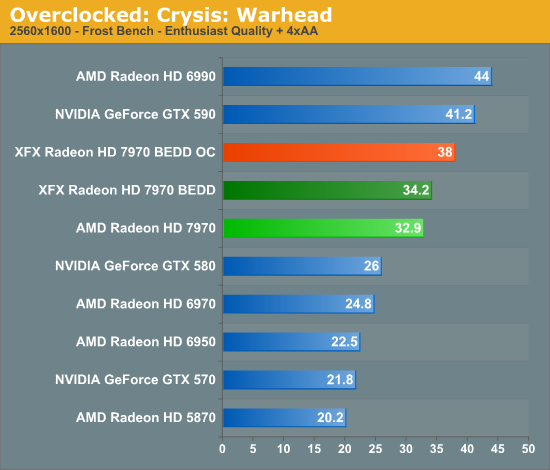
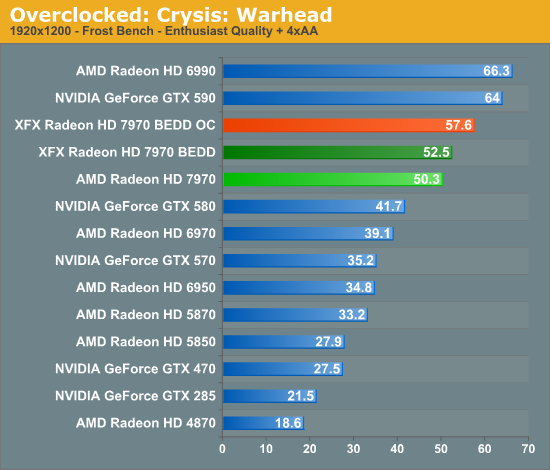
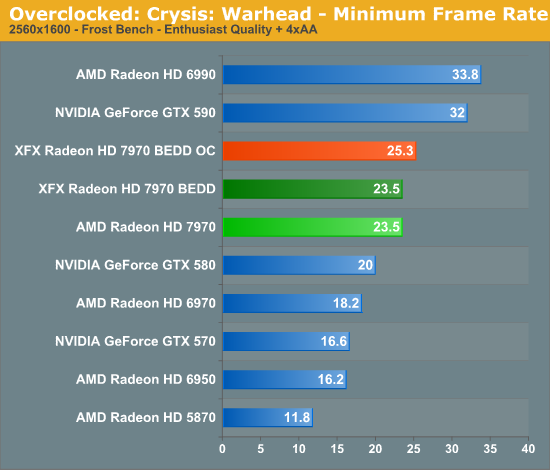
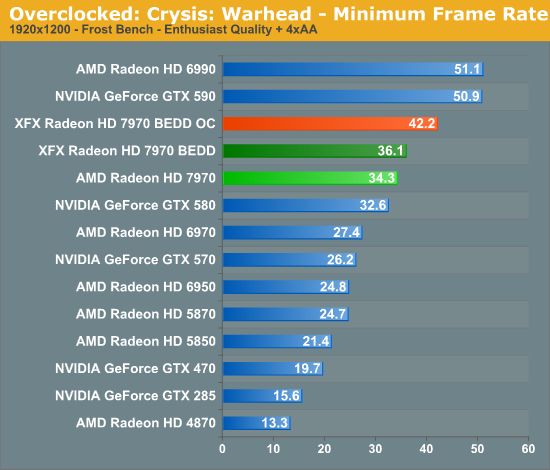
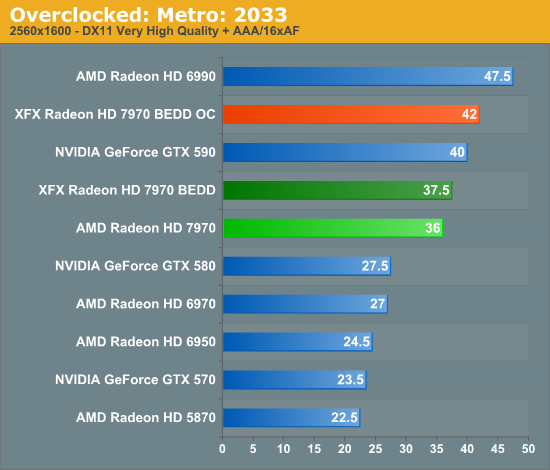
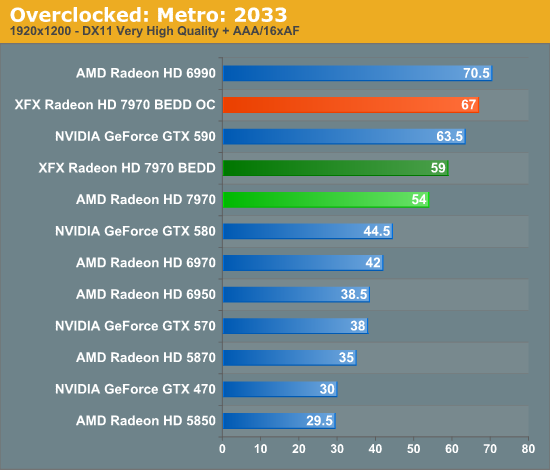
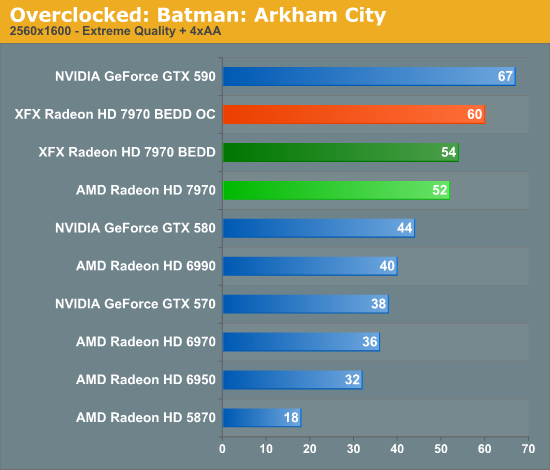
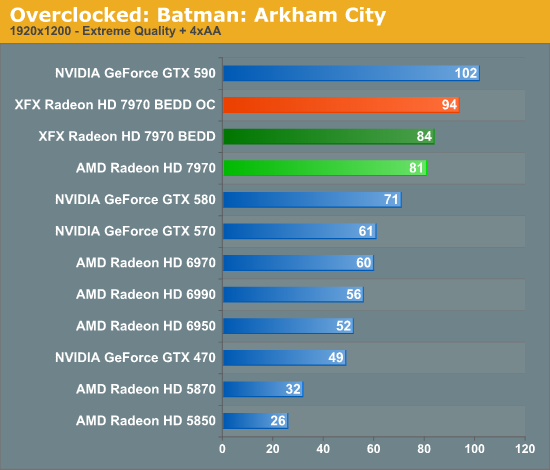
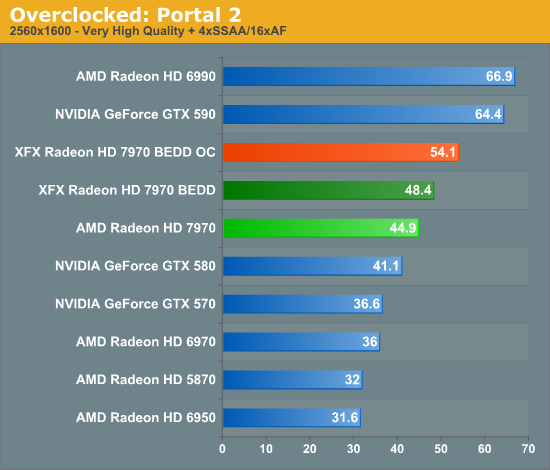
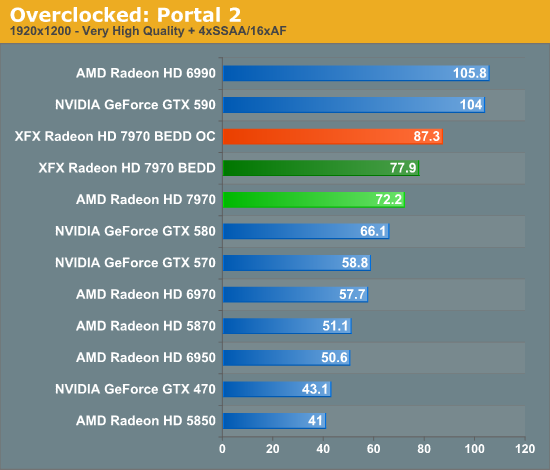
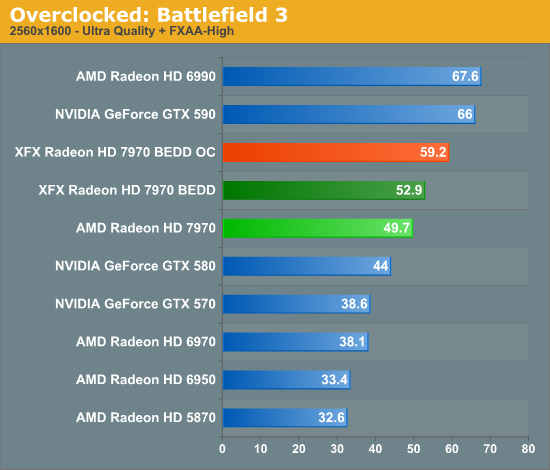
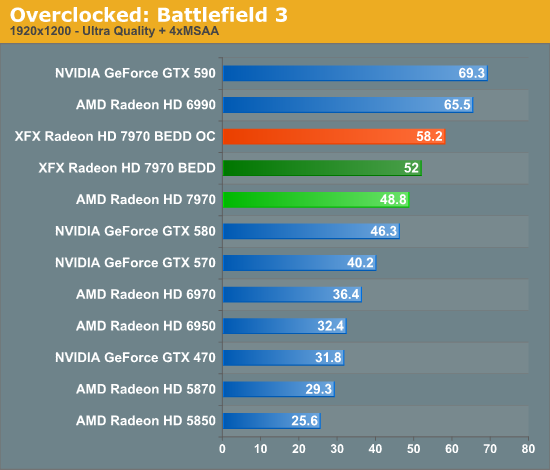
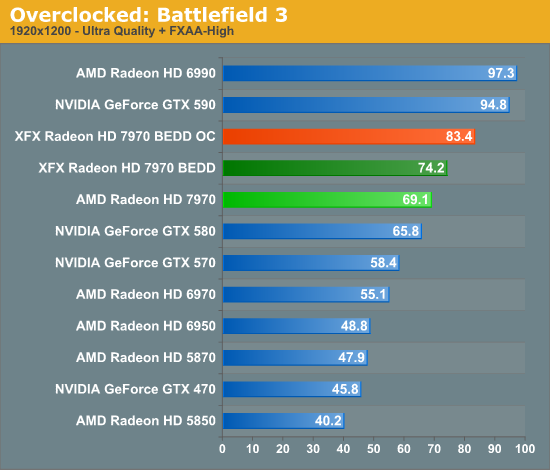
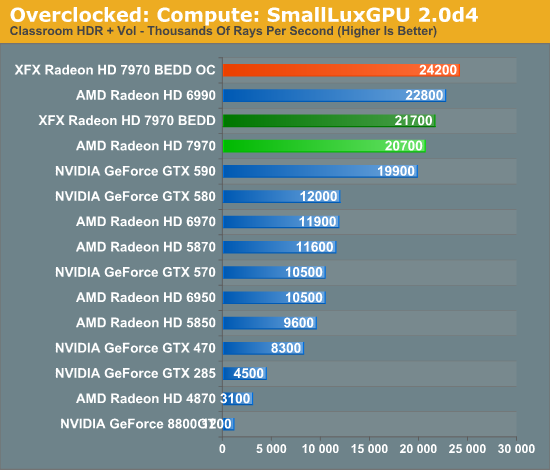
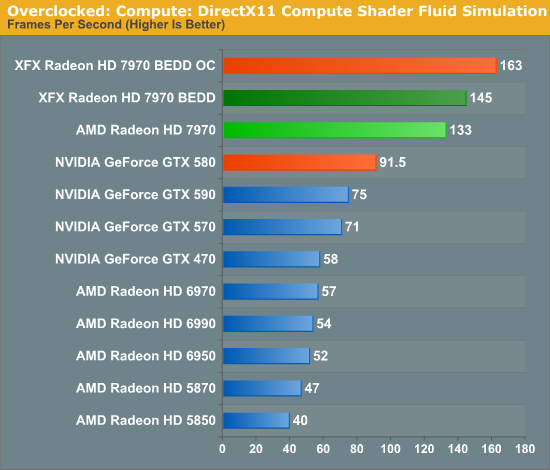
The end result of a further 11% overclock to both the GPU and memory clock results in a very consistent 11% performance increase across the board. From Crysis to Battlefield 3 everything jumps up by 11%, and the combination of the two overclocks means that our overclocked BEDD leaves just about every other single-GPU video card in the dust. Even the dual-GPU 6990 and GTX 590 have their leads seriously eroded, and in a few cases the overclocked BEDD will pull ahead of the GTX 590 in games that AMD does particularly well in. If the reference 7970 and BEDD didn’t impress you, certainly this will.
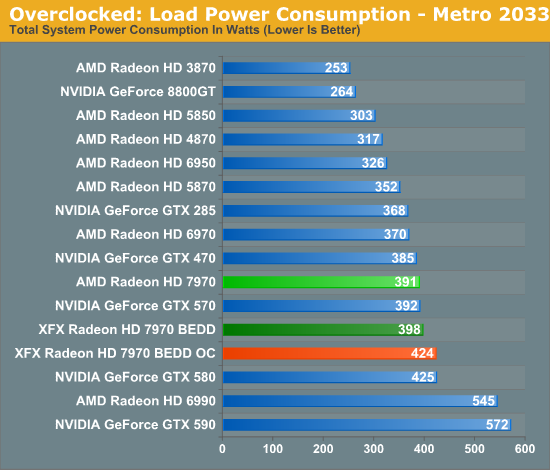
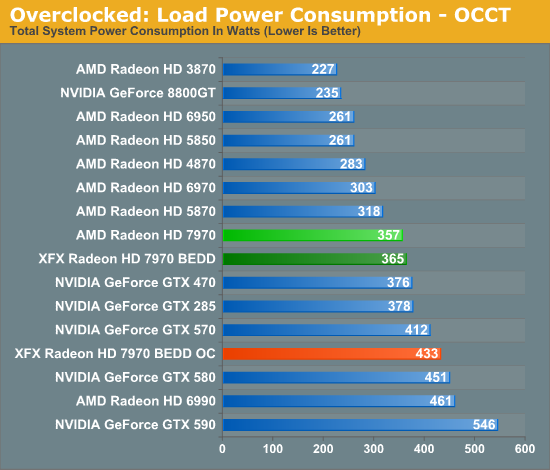
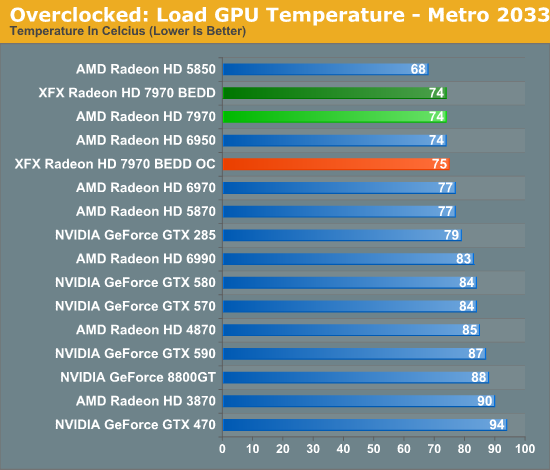
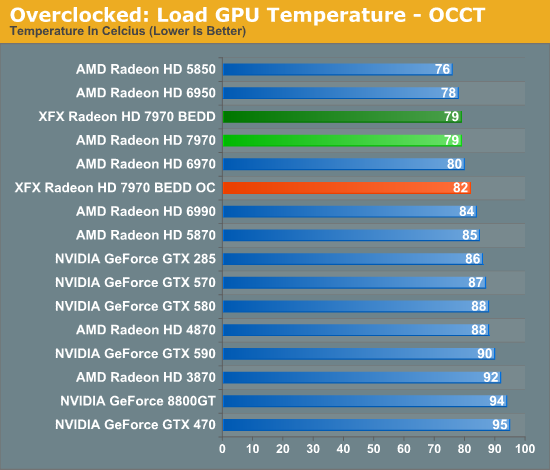
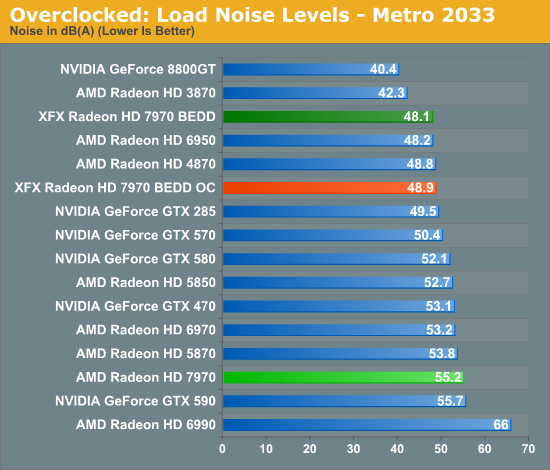
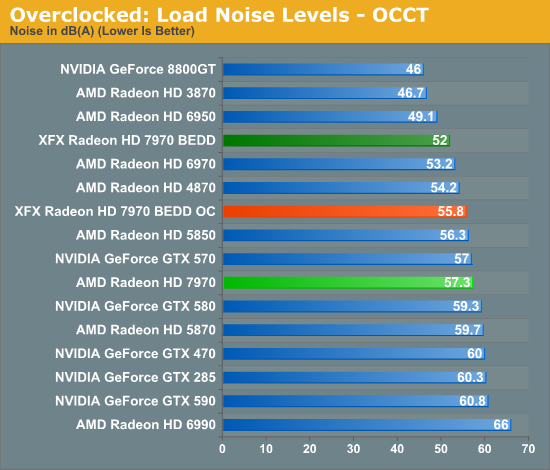
So what’s the tradeoff for this overclock? It’s actually very little. Even with our increased PowerTune limit – which doesn’t increase the power consumption, just the potential for power consumption – power consumption under Metro only rises 26W, and at least some of this will be additional work on the CPU in response to the relaxed GPU bottleneck. OCCT looks worse, but again this has more to do with the PowerTune limit than the overclock.
The fact that this overclock has had a minimal impact on the power consumption of our BEDD is reinforced by our temperature and noise data. Under Metro the overclocked BEDD gets 1C warmer and 2dB louder versus its factory clocks, which is a very small increase given the 11% overclock. So long as we don’t touch the core voltage for the BEDD (or any other 7970), the power tradeoff for overclocking is nearly non-existent, which is fantastic news given that we’ve just driven a 7970 21% over AMD’s reference clocks on reference voltage.










93 Comments
View All Comments
piroroadkill - Monday, January 9, 2012 - link
I'm not one of those people. I'm not buying a 7970.But just because you don't think it offers a large enough increase is an absolutely meaningless statement.
Fact is, people bought stuff like 8800 Ultra, 7800GTX SLI, Vapochill, and so on.
Cost is not a factor.
Morg. - Monday, January 9, 2012 - link
you're a head case.VRAM is a non-issue for 2011 games in low resolution.
SlyNine - Monday, January 9, 2012 - link
But people do care about heat. Thats the biggest reason to keep power usage down when its not in use.If your like me and your gaming PC is also your server you don't want much more then 100watts idle.
Which is why I love my 2600k @4.4ghz w/ 5870. At idle its only pulling around 120 watts.
Sabresiberian - Monday, January 9, 2012 - link
The cheapest GTX 580 on newegg is $480 AFTER rebate (479.99). Even TigerDirect doesn't quite match that price. I did a search and came up with one seller that is pricing the GTX 580 near $400, some company named Starworth Computers. Maybe it's legit, but I'm wondering why they have it listed $100 or more below everyone else.The only thing accurate about your post is your self-appointed name.
WileCoyote - Monday, January 9, 2012 - link
I accept your challenge:http://www.microcenter.com/single_product_results....
3GB 580, picked one up last week. $429.99 - $300MIR = $399.99
Boo-yeah!
If the 580 hadn't fallen in price I would have purchased the 7970.
Duraz0rz - Monday, January 9, 2012 - link
The card you linked is a 1.5GB card.iamezza - Tuesday, January 10, 2012 - link
lol, failMorg. - Monday, January 9, 2012 - link
It would take a fanboy to think that card is less than 6% faster than a gtx580 ;)Just bring that 7970 to GTX580 TDP ... and you'll start understanding ;)
The only advantage the GTX580 ever had over any card was that it had the bigger TDP . nothing else.
ET - Monday, January 9, 2012 - link
It would take a fanboy to buy a card that's less than 6% faster a Radeon 6970 and costs $200 more. Namely the GTX 580.deaner - Monday, January 9, 2012 - link
It would take a fanboy to quote such % to $ value, against a GTX 580. Maybe, just maybe there are people who are AMD fans!!?? That is an intersting thought.... Curious to your stats as well.